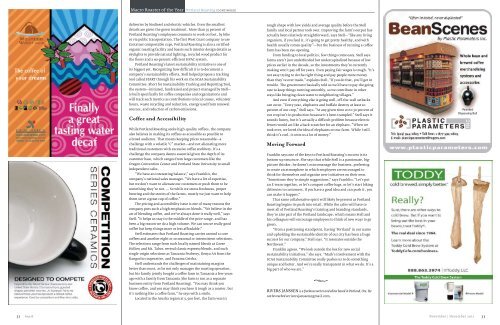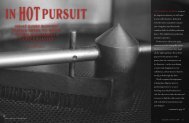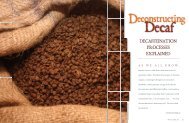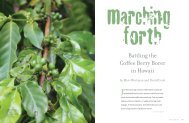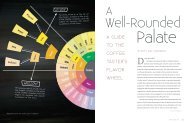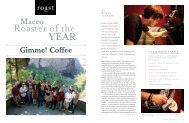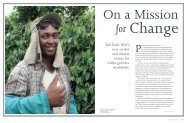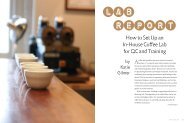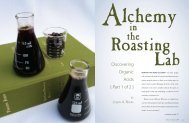PORTLAND ROASTING - Roast Magazine
PORTLAND ROASTING - Roast Magazine
PORTLAND ROASTING - Roast Magazine
You also want an ePaper? Increase the reach of your titles
YUMPU automatically turns print PDFs into web optimized ePapers that Google loves.
Macro <strong>Roast</strong>er of the Year Portland <strong>Roast</strong>ing (continued)<br />
deliveries by biodiesel and electric vehicles. Even the smallest<br />
details are given the green treatment. More than 35 percent of<br />
Portland <strong>Roast</strong>ing’s employees commute to work on foot, by bike<br />
or via public transportation. The first West Coast company to use<br />
Ecotainer compostable cups, Portland <strong>Roast</strong>ing is also a certifiedorganic<br />
roasting facility and boasts such interior design details as<br />
skylights to provide natural lighting, recycled wood product for<br />
the floors and a 90-percent-efficient HVAC system.<br />
Portland <strong>Roast</strong>ing’s latest sustainability initiative is one of<br />
its biggest yet. Recognizing how difficult it is to document a<br />
company’s sustainability efforts, Stell helped propose a tracking<br />
tool called START through his work on the SCAA Sustainability<br />
Committee. Short for Sustainability Tracking and Reporting Tool,<br />
the system—initiated, fundraised and project-managed by Stell—<br />
is built specifically for coffee companies and organizations and<br />
will track such metrics as contributions to local causes, volunteer<br />
hours, waste recycling and reduction, energy used from renewal<br />
sources, and reduction of carbon emissions.<br />
Coffee and Accessibility<br />
While Portland <strong>Roast</strong>ing seeks high-quality coffees, the company<br />
also believes in making its coffees as accessible as possible to<br />
a broad audience. That means keeping prices reasonable—a<br />
challenge with a volatile “C” market—and not alienating more<br />
traditional customers with excessive coffee snobbery. It’s a<br />
challenge the company deems essential given the depth of its<br />
customer base, which ranges from large customers like the<br />
Oregon Convention Center and Portland State University to small<br />
independent cafes.<br />
“We have an interesting balance,” says Franklin, the<br />
company’s national sales manager. “We have a lot of expertise,<br />
but we don’t want to alienate our customers or push them to be<br />
something they’re not. … So while we stress freshness, proper<br />
brewing and the stories of the farms, mostly we just want to help<br />
them serve a great cup of coffee.”<br />
The pricing and accessibility issue is one of many reasons the<br />
company puts such a high emphasis on blends. “We believe in the<br />
art of blending coffee, and we’ve always done it really well,” says<br />
Stell. “It helps us stay in the middle of the price range, and has<br />
been a big reason we do a high volume. We can source really good<br />
coffee but keep things more or less affordable.”<br />
Stell estimates that Portland <strong>Roast</strong>ing carries around 12 core<br />
coffees and another eight or so seasonal or intermittent selections.<br />
The selections range from such locally named blends as Goose<br />
Hollow and Mt. Tabor, several classic espresso blends, and such<br />
single-origin selections as Tanzania Peaberry, Kenya AA from the<br />
Kangocho cooperative, and Panama Geisha.<br />
Stell understands the challenges of maintaining margins<br />
better than most, as he not only manages the roasting operation,<br />
but his family jointly bought a coffee farm in Tanzania a few years<br />
ago with a family from Tanzania (the farm is run as a separate<br />
business entity from Portland <strong>Roast</strong>ing). “You may think you<br />
know coffee, and you may think you have it tough as a roaster, but<br />
it’s nothing like a coffee farm,” he says with a smile.<br />
Located in the Arusha region at 5,500 feet, the farm was in<br />
rough shape with low yields and average quality before the Stell<br />
family and local partner took over. Improving the farm’s output has<br />
actually been relatively straightforward, says Stell—“like any living<br />
organism, if you feed it, it’s going to get pretty healthy, and with<br />
health usually comes quality”—but the business of running a coffee<br />
farm has been eye-opening.<br />
From funding to local politics, few things come easy. Stell says<br />
farms aren’t just underfunded but undercapitalized because of low<br />
prices earlier in the decade, so the investments they’re currently<br />
making won’t pay off for years. Even paying fair wages is tough. “It’s<br />
not easy trying to do the right thing and pay people more money<br />
than they’ve ever made,” explains Stell. “If you do that, you’ll get in<br />
trouble. The government basically told us we’d have to pay the going<br />
rate to keep things running smoothly, so we contribute in other<br />
ways like bringing clean water to neighboring villages.”<br />
And even if everything else is going well, off-the-wall setbacks<br />
can occur. “Every year, elephants and buffalo destroy at least 10<br />
percent of our crop,” Stell says. “At any given time 20 to 30 percent of<br />
our crop isn’t in production because it’s been trampled.” Stell says it<br />
sounds funny, but it’s actually a difficult problem because electric<br />
fences would act like a back-scratcher for an elephant. “When we<br />
took over, we loved the idea of elephants on our farm. While I still<br />
think it’s cool, it costs us a lot of money.”<br />
Moving Forward<br />
Franklin says one of the keys to Portland <strong>Roast</strong>ing’s success is its<br />
bottom-up structure. She says that while Stell is a passionate, bigpicture<br />
thinker, he doesn’t micromanage the business, preferring<br />
to create an atmosphere in which employees are encouraged to<br />
think for themselves and organize new initiatives on their own.<br />
“Sometimes they’re simple suggestions,” says Franklin. “Let’s put<br />
an E-team together, or let’s compost coffee bags, or let’s start biking<br />
deliveries to customers. If you have a good idea and can push it, you<br />
can make it happen.”<br />
That same collaborative spirit will likely be present as Portland<br />
<strong>Roast</strong>ing begins its push into retail. While the cafes will have to<br />
meet all of Portland <strong>Roast</strong>ing’s training and branding standards,<br />
they’re also part of the Portland landscape, which means Stell and<br />
his colleagues will encourage employees to think of new ways to go<br />
green.<br />
“From a positioning standpoint, having ‘Portland’ in our name<br />
and upholding the sustainable identity of our city has been a huge<br />
success for our company,” Stell says. “It resonates outside the<br />
Northwest.”<br />
Franklin agrees. “We look outside the box for new social<br />
sustainability initiatives,” she says. “Mark’s involvement with the<br />
SCAA Sustainability Committee really pushes us to do something<br />
unique and better. And we’re really transparent in what we do. It’s a<br />
big part of who we are.”<br />
Rivers Janssen is a freelance writer and editor based in Portland, Ore. He<br />
can be reached at riversjanssen@gmail.com.<br />
32 roast November | December 2011 33


